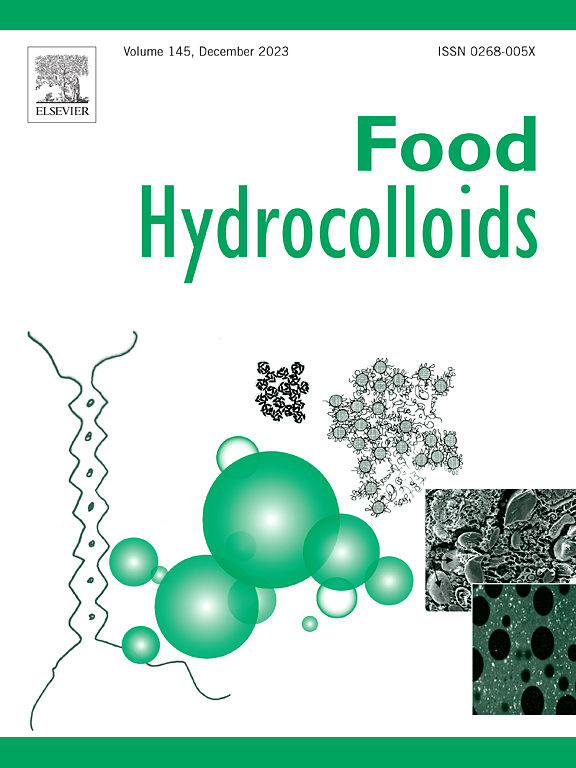Effect of dry heat treatment temperature of skim milk powder on the improved heat stability of recombined filled evaporated milk
IF 11
1区 农林科学
Q1 CHEMISTRY, APPLIED
引用次数: 0
Abstract
The incubation temperature is known to play an important role in the Maillard reaction and protein cross-linking during dry heat treatment of protein-sugar mixtures. In this study, dry heating of skim milk powder (SMP) at various incubation temperatures from 60 to 80 °C was investigated. The effect of this SMP pretreatment on the heat stability of the derived recombined filled evaporated milk (RFEM) was evaluated via particle size analyses and viscosity measurements, which showed that the required incubation time to obtain an optimal heat stability was greatly shortened with increasing dry-heat incubation temperature: whereas 8 h of dry heat incubation was needed at 60 °C, 2 h at 70 °C, and 1 h at 80 °C were sufficient to obtain a heat stable SMP, respectively. This effect was thought to be due to the fact that elevated incubation temperatures accelerated glycation between lactose and milk proteins, as indicated by free amino group content analysis and SDS-PAGE. However, SMP subjected to excessive incubation failed to maintain the original droplet diameter and viscosity after heating and showed a poor heat stability. PCA and correlation analysis results suggested that the solubility of the dry heated SMP and the heat stability of the derived RFEM were both correlated to the sulfhydryl content and carbonyl content (R > 0.6). Overall, the kinetic study of the protein carbonyl content, the sulfhydryl content and the degree of glycation elucidated the remarkable influence of dry heat incubation temperature on the SMP properties and offered a valuable tool for optimizing the SMP functional properties.

脱脂奶粉干热处理温度对复合填充炼乳热稳定性的影响
在蛋白-糖混合物干热处理过程中,培养温度对美拉德反应和蛋白质交联起重要作用。本研究对脱脂奶粉(SMP)在60 ~ 80℃不同培养温度下的干法加热进行了研究。通过粒度分析和粘度测量来评估SMP预处理对衍生的复合填充炼乳(RFEM)热稳定性的影响,结果表明,随着干热培养温度的升高,获得最佳热稳定性所需的培养时间大大缩短,而在60°C下进行8 h的干热培养,在70°C下进行2 h的培养,在80°C下进行1 h的培养足以获得热稳定的SMP。根据游离氨基含量分析和SDS-PAGE,这种效应被认为是由于升高的孵育温度加速了乳糖和乳蛋白之间的糖基化。然而,经过过度孵育的SMP加热后不能保持原有的液滴直径和粘度,热稳定性较差。主成分分析和相关分析结果表明,干热SMP的溶解度和衍生RFEM的热稳定性均与巯基含量和羰基含量(R >;0.6)。总之,对蛋白质羰基含量、巯基含量和糖基化程度的动力学研究阐明了干热培养温度对SMP性能的显著影响,为优化SMP的功能性能提供了有价值的工具。
本文章由计算机程序翻译,如有差异,请以英文原文为准。
求助全文
约1分钟内获得全文
求助全文
来源期刊

Food Hydrocolloids
工程技术-食品科技
CiteScore
19.90
自引率
14.00%
发文量
871
审稿时长
37 days
期刊介绍:
Food Hydrocolloids publishes original and innovative research focused on the characterization, functional properties, and applications of hydrocolloid materials used in food products. These hydrocolloids, defined as polysaccharides and proteins of commercial importance, are added to control aspects such as texture, stability, rheology, and sensory properties. The research's primary emphasis should be on the hydrocolloids themselves, with thorough descriptions of their source, nature, and physicochemical characteristics. Manuscripts are expected to clearly outline specific aims and objectives, include a fundamental discussion of research findings at the molecular level, and address the significance of the results. Studies on hydrocolloids in complex formulations should concentrate on their overall properties and mechanisms of action, while simple formulation development studies may not be considered for publication.
The main areas of interest are:
-Chemical and physicochemical characterisation
Thermal properties including glass transitions and conformational changes-
Rheological properties including viscosity, viscoelastic properties and gelation behaviour-
The influence on organoleptic properties-
Interfacial properties including stabilisation of dispersions, emulsions and foams-
Film forming properties with application to edible films and active packaging-
Encapsulation and controlled release of active compounds-
The influence on health including their role as dietary fibre-
Manipulation of hydrocolloid structure and functionality through chemical, biochemical and physical processes-
New hydrocolloids and hydrocolloid sources of commercial potential.
The Journal also publishes Review articles that provide an overview of the latest developments in topics of specific interest to researchers in this field of activity.
 求助内容:
求助内容: 应助结果提醒方式:
应助结果提醒方式:


